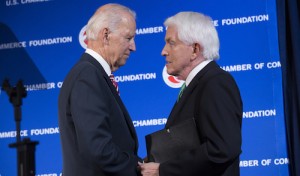Vice President Joe Biden, Business Leaders Address Youth Unemployment
 •
•
Tim Lemke, Manager of Digital Content, U.S. Chamber of Commerce Foundation
More than six million young people are out of school and out of work.
It’s a problem that could have serious impacts on the quality of the nation’s labor force and the financial health of an entire generation, business and political leaders said during a forum hosted by the U.S. Chamber of Commerce Foundation.
“It poses a serious threat to our economy and America’s long-term prosperity,” said Chamber Foundation President John R. McKernan, during the Oct. 3 event. “It telegraphs a growing trend of underprepared workers in the future.”
The Chamber Foundation and its Center for Education and Workforce hosted the “Youth Employment Matters!” forum in conjunction with the Urban Alliance, zeroing in on employer-driven solutions to the problem of youth unemployment.
Vice President Joe Biden served as the keynote speaker, and said that while the economy is improving, the high unemployment rate among young people has prevented a more robust recovery.
The Opportunity Nation Coalition and Corporation for National and Community Service have pegged the number of unemployed young people at more than six million. Officials said that each of those unemployed people could cost the country $700,000 over the course of their lives.
“If you’re 18 to 24 and you’re out of work and out of school, it doesn’t bode well for you when you’re 35 and 45,” Biden said.
U.S. Chamber of Commerce President Tom Donohue said younger people must enhance their skills to mesh with the jobs of the 21st century.
“The challenge that brings all of us together today is bridging the opportunity gap—especially for the next generation of Americans who will one day lead this nation,” said Donohue. “It’s not just the future of these young people that’s at stake. The economic and competitive future of this country will be determined by how we respond to the growing trend of youth unemployment”
Vice President Biden noted that the overall unemployment rate has been dropping, but said there has been a challenge in matching up workers with available jobs.
He reiterated President Obama’s stance that the economy would benefit from greater infrastructure investment—something also supported by the U.S. Chamber of Commerce.
“The economy is recovering in a macroeconomic sense, but below the surface here, there’s a lot of discontent, still,” he said.
Eshauna Smith, CEO of the Urban Alliance, touted the organization’s efforts to address the youth unemployment problem. A full 100% of the group’s interns graduate from high school, while 75% goes on to college.
But the six million figure still remains a reality.
“The need is still great,” she said.
Corporations Engaging With Youth
The Urban Alliance was hailed as a great example of an organization that has assisted young people in staying on track educationally and finding work.
Companies larger and small have rolled out similar programs to give young people experience. In fact, Marriott officials said that they have mentored 10,000 young workers annually through a program at Courtyard by Marriott hotels.
But corporate leaders said that more could be done.
“Businesses have to push the envelope internally to make this work,” said Andrew Plepler, Global Corporate Social Responsibility Executive and Consumer Policy Executive for Bank of America. “It’s much easier to not employ youth at this age. To get companies to understand how successful it can be for the companies and the youth is really what will tip the scales.”
Thomas Nides, Vice Chairman of Morgan Stanley, noted “the easiest thing to do is for companies to just write checks.”
Other leaders said there is no lack of corporate and nonprofit programs to assist young people, but that they must be more effectively leveraged with government initiatives.
“We are program rich, but system poor,” said Melody Barnes, CEO of Melody Barnes Solutions and former Domestic Policy Council for President Obama.








